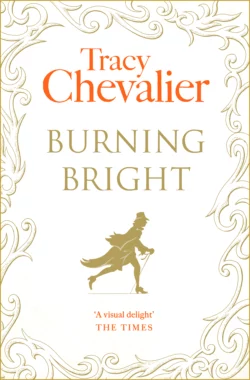Burning Bright

Tracy Chevalier
Тип: электронная книга
Жанр: Современная зарубежная литература
Язык: на английском языке
Стоимость: 776.11 ₽
Статус: В продаже
Издательство: HarperCollins
Дата публикации: 16.04.2024
Отзывы: Пока нет Добавить отзыв
О книге: Flames and funerals, circus feats and seduction, neighbours and nakedness: a sparkling historical drama from the bestselling author of Girl with a Pearl Earring.Uprooting from their quiet Dorset village to the carnal streets of London, young Jem Kellaway and his family feel far from home. The Kellaways struggle to fi nd their place in a tumultuous city, alive with repercussions from the blood-splattered French Revolution. Luckily streetwise Maggie Butterfi eld is on hand to show Jem the ropes. Together theyencounter the neighbour they’ve been warned about: radical poet and artist William Blake. Jem and Maggie’s passage from innocence to experience becomes the very stuffof poetic inspiration.